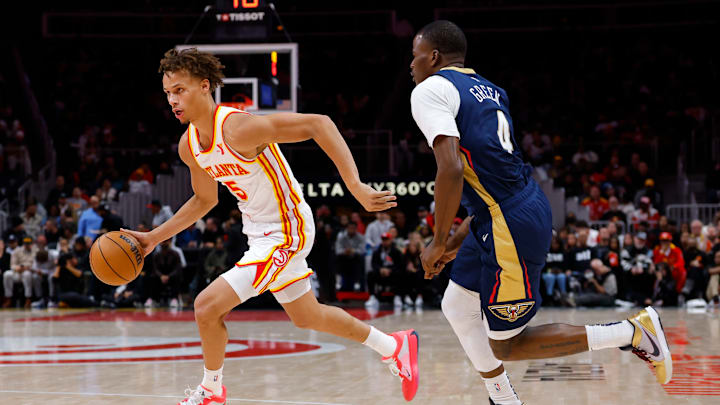The human psyche is a fascinating study, as we're far more susceptible to mental influences than we ever realize in the present moment. Two strong triggers that continue to get underrated are nostalgia and novelty. These sentiments can sway our logic and reasoning in massively significant ways.
A great example of this is the connection between Dyson Daniels, his former team, the New Orleans Pelicans, and his new team, the Atlanta Hawks. Amid this season from hell for the Pels, it's easy to reminisce on easier times and regret the trade that sent Daniels to ATL and brought back Dejounte Murray, the All-Star point guard who was supposed to drag New Orleans over the hump but never got a real shot with this core due to injuries.
As for the Hawks, they've been getting bombarded with praise for identifying a rising star in Daniels and acquiring him from the Pels, even if the trade was fair value, even in hindsight. Dyson has played well for his new squad, taking advantage of his increased opportunities and converting them into legitimately positive production. But it's not like the Pelicans just gave up on him. They saw his flaws and decided that he was an acceptable loss in order to get Murray, an objectively better talent and fit for this team at full strength. As well as he's played for the Hawks, Dyson Daniels is still far from a perfect player, and Atlanta is starting to learn the holes in his game the hard way.
Dyson Daniels remains what he was for the Pelicans: a promising talent with elite defensive potential but serious offensive flaws
I've already outlined how Daniels was starting to get overrated with the Hawks, due to novelty. A young player on a new team seemingly exploding onto the scene is bound to draw eyeballs and ire for the former organization that sent him away.
It's not that he doesn't deserve praise or that Atlanta shouldn't be lauded for getting a high-quality prospect in return for Murray. It's the notion that this was a completely lopsided deal in favor of the Hawks that's disingenuous. Of course, in retrospect, the Pelicans would have been better off keeping a promising young player considering that they're on the verge of a complete teardown now. But, at the time, New Orleans was looking to build a contender around Zion Williamson, needed a legitimate point guard, and got an All-Star-level talent for fair value. Not to mention that the Pelicans got Dejounte at a bargain compared to what the Hawks originally paid to get him from the San Antonio Spurs just a year prior. Yet, New Orleans has received tons of criticism for the trade.
The fact of the matter is that Dyson Daniels is an extremely flawed offensive player. On the year, he's averaging 13.4 points per game on 45 percent shooting and just 30 percent marks from beyond the arc. He's yet to hit more than two triples in a single game for the Hawks.
It's not just his shooting either, although that is the greatest hole in his offensive game. He's also not nearly the playmaker that he was projected to be or needs to be to have a positive impact on both ends of the court. He has a loose handle and is a non-threat outside of the paint. He can make advanced reads as a passer and can thread the needle on a variety of different dishes, but his inability to collapse defenses keeps him from being able to truly lead an offense.
Atlanta has done a few things to open up his game including unleashing him on defense to help him generate transition opportunities and using him as a screener to create open looks for him at the rim, but these extra lengths are simply band-aids for an imperfect offensive player.
The Hawks are a middling team in large part because of his flaws. They don't have nearly enough shooting or a reliable backup point guard, two issues that are directly caused by Daniels's faults. According to Cleaning the Glass (subscription required), Atlanta has a -13.3 net rating in 202 possessions when Daniels is on the floor without Trae Young. In those lineups, the Hawks have just a 105 offensive rating which is in the ninth percentile in the NBA.
At this point in his career, Daniels is a defensive specialist on the wings who's a non-shooter but offers some offensive potential as a secondary playmaker and transition threat. For those keeping score, the Pelicans already have one of those in Herb Jones who's more impactful on D and has shown more promising glimpses as both a shooter and an overall offensive talent.
Still only 21 years old, Daniels has plenty of time to grow and develop his offensive bag. If he can't though, he'll always be a liability on that end of the court which will severely limit his ceiling.
